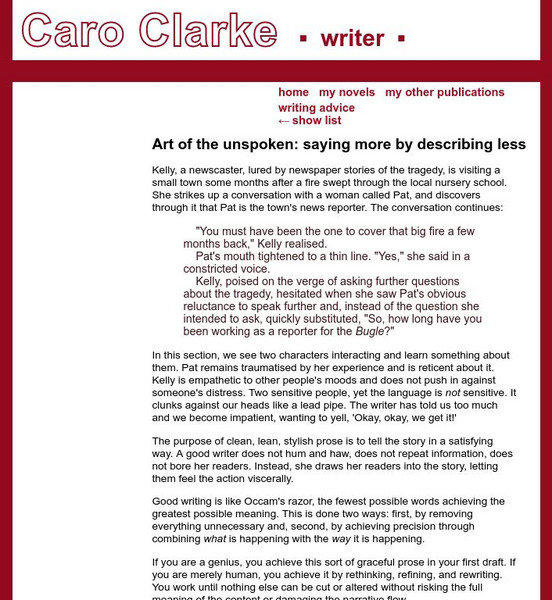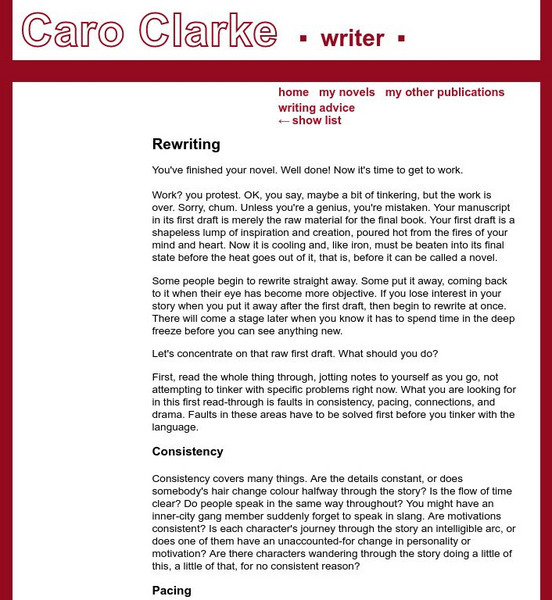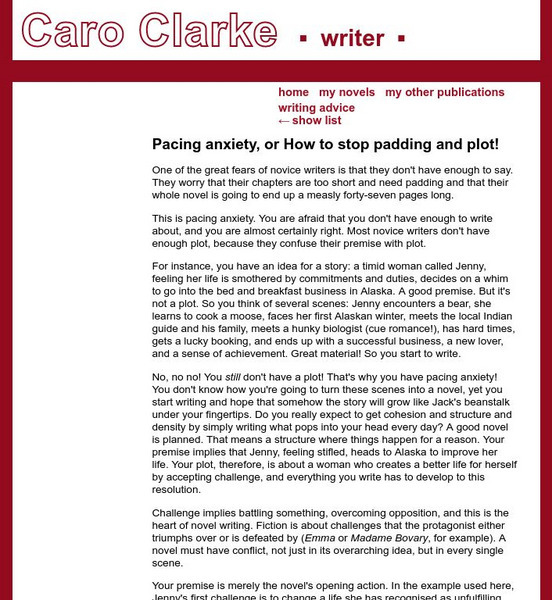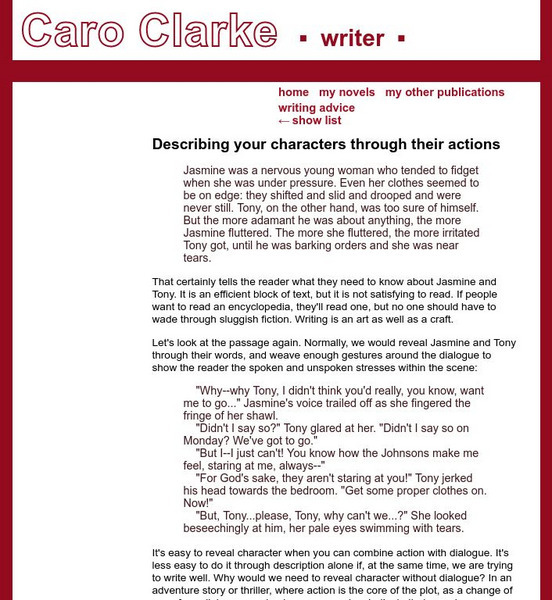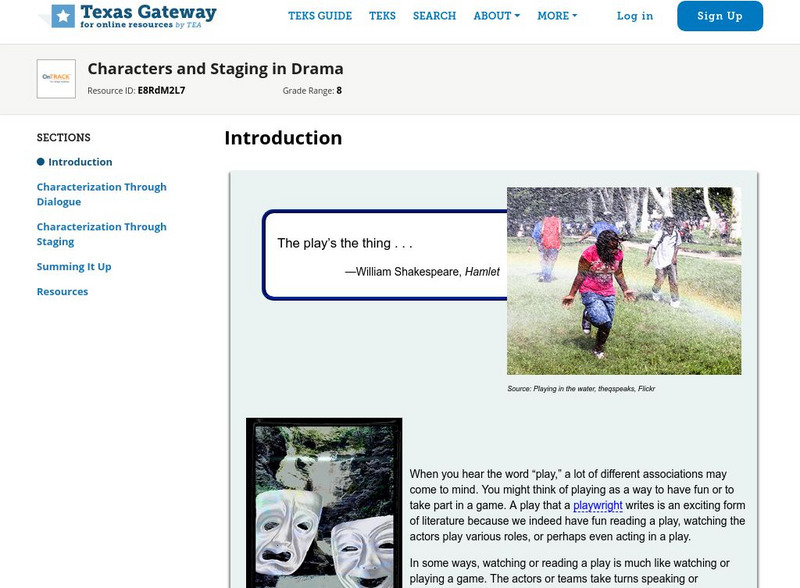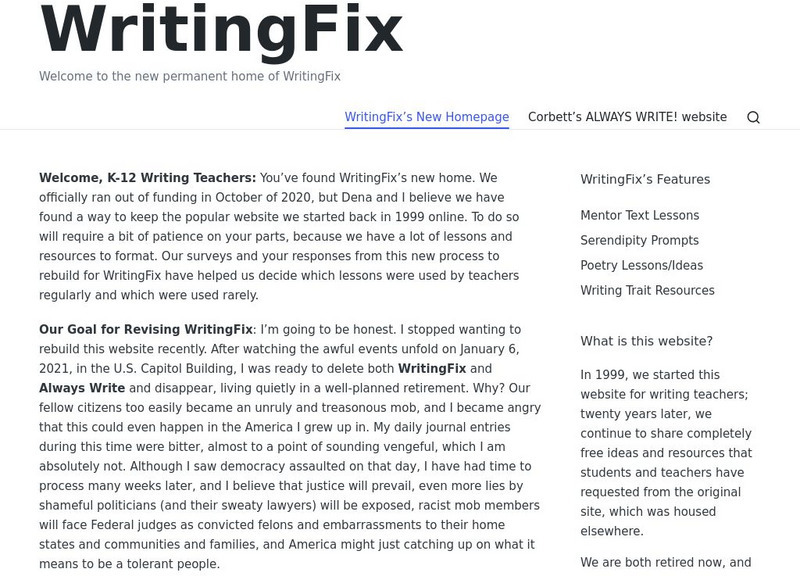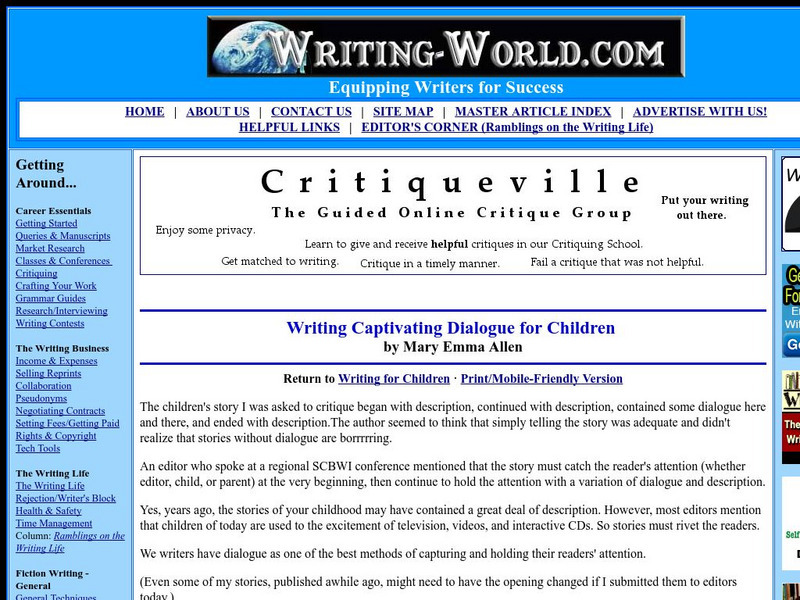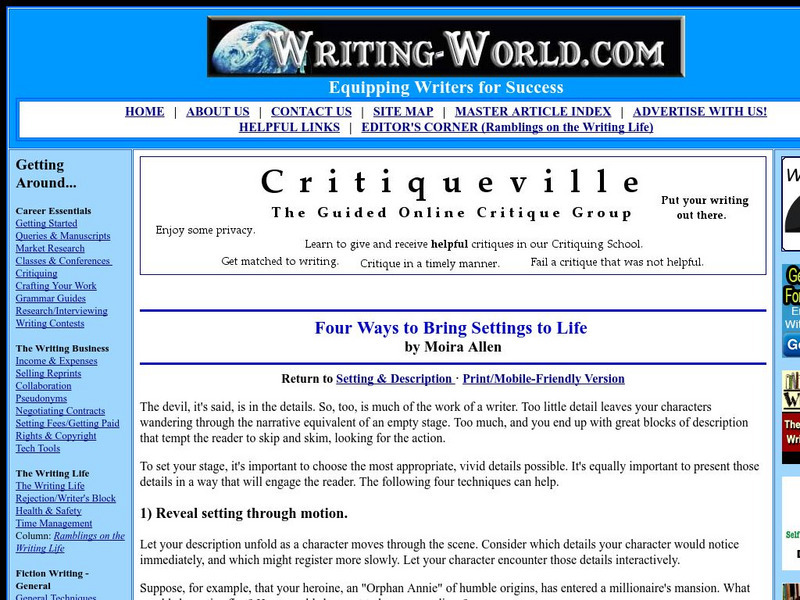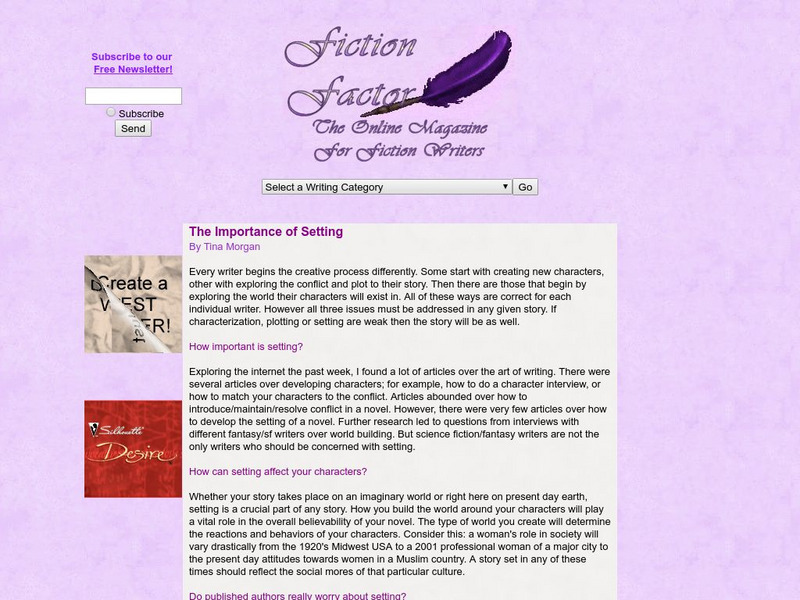Caro Clarke
The Art of the Unspoken: Saying More by Describing Less
This is the thirteenth article in a series that was developed to help the new novel author. This article focuses on how good descriptions aren't necessarily connected with a lot of words, good descriptions are clean and to the point.
Caro Clarke
Historical Fiction: Who Rules?
This is the fifteenth article in a series designed to help the new novel author. This article focuses on the genre of historical fiction and the role of the author. Is the author a researcher or a story-teller?
Caro Clarke
Rewriting
This is the 17th article in a series that helps the new fiction author with the final step--revision.
Harold D. Underdown
Writing Young Adult and Children's Fiction and Fantasy
A great article concerning writing children's literature, especially in the area of fantasy or science fiction. The author provides information concerning how to develop characters, creating literary elements, and discusses some pitfalls...
Other
Fiction Writing Tips: Creating a Vivid Setting
Some excellent guidelines to consider when evaluating your setting in a short story or novel. Discusses the importance of setting, some examples, as well as practical advice in setting your story. W.11-12.3d Sensory/precise lang narratives
Caro Clarke
Caro Clarke: Description: What's It For?
This is the twelfth article in a series that is designed to help the new novel writer. This article focuses on how to effectively use descriptions in any writing.
Caro Clarke
Writing Advice: Where to Start?
This writing tutorial focuses on helping the aspiring author find a good place to start on his or her fiction.
Caro Clarke
Caro Clarke: Pacing Anxiety, or How to Stop Padding and Plot!
This is the seventh installment of a series giving advice to the author who is new to writing novels. This article focuses on how to take your characters and use them and their conflicts to develop the plot of your story. W.9-10.3b...
Caro Clarke
Caroclarke: Dialogue: The Best Action
This is the fourteenth article in a series published with the goal of helping the new novel author. This article focuses on using dialogue to advance the action of the story. Links on the left offer other information about story writing.
Writing Fix
Writing Fix: Inventing a New Word
Inspired by the main character's actions in Frindle by Andrew Clements, students will be asked to reinvent an everyday object with a brand new word. They will need to imagine a character has reinvented their word, and then they will...
Caro Clarke
Describing Your Characters Through Their Actions
This is the tenth in a series of articles designed to help the new novel author. This article focuses on how to develop characters through their actions instead of simply relying on dialogue and description of thoughts. W.11-12.3d...
Other
Storytelling in the Classroom
There are several steps to becoming a storyteller. Find out what they are and be on your way to becoming a storyteller here! Learn how to find good stories to tell, and how to tell them to an audience effectively.
Texas Education Agency
Texas Gateway: Characters and Staging in Drama
Learn how playwrights characterize their protagonists and antagonists through the dialogue and staging of their plays.
Texas Education Agency
Texas Gateway: Analyze Linear Plot Developments in Literary Texts/fiction
[Accessible by TX Educators. Free Registration/Login Required] You will learn how to use the elements of linear plot development to determine whether and how conflicts are resolved.
Writing Fix
Writing Fix: Mechanical Monsters
In this lesson, students read the description of the mechanical dog from Ray Bradbury's Fahrenheit 451 and then work in groups to create and write descriptions of their own futuristic pet.
Other
Writing world.com: Writing Dialogue for Children
A good site for teachers and writers looking to write for children, or teach children how to write dialogue. Includes tips and guidelines.
Other
Writing World: Four Ways to Bring Settings to Life
A great resource outlining four major ways to make settings appear more real and genuine in fiction. Deals with themes such as motion, experience, mood, and the senses. W.11-12.3d Sensory/precise lang narratives
Texas Education Agency
Texas Gateway: Characters and Staging in Drama
[Accessible by TX Educators. Free Registration/Login Required] In this lesson, you will analyze how different playwrights characterize, or develop, their protagonists and antagonists through the dialogue and staging of their plays.
Texas Education Agency
Texas Gateway: Analyze the Central Characters in Literary Text/fiction
In this lesson, you will discover some ways that writers reveal the complexity of their characters. By closely analyzing one author's characters, you'll come to see how their words, actions, and interactions with one another can shape a...
E Reading Worksheets
E Reading Worksheets: Writing Narrative Essays
This article provides the components of narrative writing. The author emphasizes ways to make narrative writing better. W.9-10.3e Conclusion
Other
Fiction Factor: The Importance of Setting
An interesting article concerning the importance of setting to any piece of fiction. Gives good information about how setting affects characters and "world-building."
Other
Jefferson County Schools: Print a Prompt
Check out this resourceful site featuring "Print a prompt." Students can choose from several different titles and prompts and they are provided with a printed copy.
Writing Fix
Writing Fix: Serendipitous Personification for Stories and Descriptions
Students will use this writing prompt generator to create a personification story or description.
Other
Literautas: Reasons for Using Dialogue in a Story
Learn about six reasons that a writer should use dialogue in a story.
